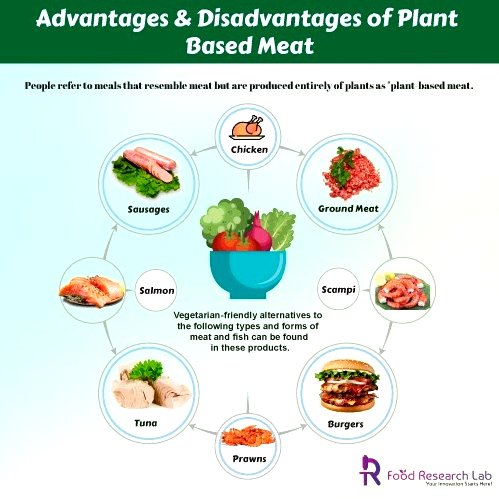People concerned with their health often explore options for finding the most healthful meat option, and this topic of conversation often revolves around hunting down "healthy" cuts of meat. Although it might be appealing, research shows there is no such thing as "healthy" meat - no matter how tempting or appealing.
Though meat is an invaluable source of protein, its benefits come with numerous health concerns that should not be discounted. Red meat, in particular, often boasts of its delicious flavors while often boasting high cholesterol and saturated fat levels that contribute to chronic illnesses and heart disease, respectively. Furthermore, occupational use of hormones and antibiotics in factory farming practices has long been a cause for public concern; such compounds accumulate in animals' fat tissue leading to further worries for human consumers.
However, alternative sources of protein may offer even more significant health advantages over traditional meats. Plant-based proteins like legumes, lentils, tree nuts and various seeds often contain far fewer cholesterol and saturated fat levels as well as providing additional benefits such as fiber, vitamins and minerals. Furthermore, tempeh, tofu and seitan can offer nutritionally complete meat substitute options without the health issues often associated with meat consumption.
While finding an ideal meat option may be impossible, healthy and sustainable options still remain. To protect your health, it's in your best interests to recognize its downsides and look into alternative proteins like plant-based or other nutrient-rich options such as this comprehensive guide covering how you can increase protein consumption through meatless options.
I. The Downside of Consuming Meat
Meat may be revered for its high protein content, but its consumption also poses significant health risks that must be carefully considered. Chief among these is saturated fat intake - one serving of beef can contain nearly 50% of an individual's recommended saturated fat intake! Sadly, increased consumption can contribute to chronic diseases like cardiovascular disease, stroke and diabetes.
Cholesterol Levels in Meat
Meat is notoriously high in cholesterol. While a certain level of cholesterol may be necessary for body functioning, excessive amounts can prove harmful. While poultry usually contains lower amounts than red meat does, it still boasts alarmingly high cholesterol counts. Fish provides a healthier protein option that may replace red meat's saturated fats and cholesterol content while mercury toxicity remains an obstacle to its consumption.
Unnatural Substances in Meat Production
Though global agricultural corporations have prohibited the use of hormones and antibiotics in meat production, its production still involves these unnatural substances. Factory farming conditions animals in inhumane environments, accumulating hormones and antibiotics in tissue and fat which ultimately makes their way to human consumers through consumption. Therefore, individuals with allergies or weak immune systems are especially at risk to these health hazards.
Ethical and Environmental Risks of Meat Consumption
Meat consumption poses both ethical and environmental risks that are concerning. Factory farming - which is commonly linked with deforestation, inhumane animal treatment practices and land degradation - often results in deforestation as a by-product. As such, this has prompted many to question both its sustainability and morality in general.
Meat remains essential to a sustainable diet, but its consumption must be limited and supplemented by other nutrient-rich foods to maintain balance in an individual's diet.
Therefore, those seeking meat alternatives can research plant-based proteins that offer similar levels of essential vitamins without endangering ethical or health concerns; there are plenty of opportunities available and it would be wise to explore all possible choices to maximize health and ethical gains.
Learn more about The Downside of Consuming Meat at mana.md.II. The Downside of Consuming Meat
When it comes to diet choices, many have the misconception that protein must only come from meat sources. Yet research supports the claim that an appropriately planned vegan or vegetarian diet can provide all essential nutrients necessary for overall health and wellbeing.
Plant-based Proteins
Plant-based proteins such as lentils, nuts, seeds and beans are an efficient and healthy source of protein. Plus, these plant-based foods often have loads of fiber, vitamins and minerals - not to mention being low in saturated fat and cholesterol content - making them great options for maintaining heart health.
Legumes
Legumes are an amazing source of versatility and can add something special to any dish, be it soup, salad or stew. Their high fiber content also provides digestive relief as well as helping weight management.
Nuts and Seeds
Nuts and seeds are incredible sources of plant-based protein and provide essential unsaturated fats, helping reduce cholesterol levels. Chia seeds, almonds, sunflower seeds and hemp seeds all contain abundant quantities of these vital nutrients for better health.
Tofu and Tempeh
Notably, both tofu and tempeh are popular meat replacements with high plant-based protein content. Tofu contains soy proteins which boost its nutritional value in any dish while tempeh is produced through fermenting soybeans which provides probiotic bacteria beneficial to digestive health.
Benefits of Plant-based Proteins
Though some may remain convinced that plant-based proteins are less satisfying than meat dishes, the truth is quite the contrary. With some creativity and effort applied in culinary preparation, plant-based meals can rival their meat counterparts both flavorfully and visually appealingly.
Plant-based proteins not only offer multiple health advantages, but they can also have an immense positive effect on the environment. Compared with traditional meat production, plant-based sources have smaller carbon footprints and require fewer natural resources - so increasing plant-based foods in one's diet is vital to ensure a sustainable future.
Incorporating Plant-based Proteins
If you're seeking a healthier and more environmentally conscious protein intake option, check out the many plant-based choices. You might be surprised at just how simple it is to incorporate lentils, nuts, seeds and beans into your diet and reap their many advantages.
III. The Benefits of Plant-Based Proteins
Exploring alternative protein sources that mimic the flavor and texture of meat has become an emerging dietary trend among health-minded individuals. While aware of its health implications, some individuals still crave its umami flavor and chewy texture despite knowing their consumption could have negative health ramifications. Luckily, science has developed numerous nutrient-dense meat alternatives which allow us to satisfy cravings without jeopardizing our health.
Tempeh
Tempeh is an incredibly popular substitute to meat for weight loss, boasting fiber, protein and probiotic content in an irresistibly nutty and chewy texture that lends itself well to stir fries, sandwiches and salads alike.
Tofu
Another protein source that works as an ideal meat alternative is tofu; its mild taste complements both sweet and savory dishes alike, plus its lower caloric intake makes it an invaluable ally when trying to reach weight loss.
Seitan
Are you craving something meaty and chewy? Look no further than seitan! This wheat gluten product mimics meat's texture perfectly and can be easily cooked on any grill, skillet or oven - perfect for those seeking lean muscle gains while losing fat!
Mushrooms
Additionally, mushrooms provide another great meat alternative, being packed full of antioxidants and boasting anti-inflammatory properties which contribute towards better overall health.
If you are not vegan, exploring other protein alternatives such as eggs, dairy products and seafood could be useful. Be mindful to consume these in moderation to limit cholesterol intake. Incorporating environmentally-friendly sources will also reduce carbon emissions while helping preserve biodiversity and the ecosystem.
Overall, while meat consumption may be dangerous to our health, there are alternative protein sources available that are less harmful. Integrating plant-based proteins like tempeh, tofu and mushrooms into our diets will provide our bodies with all of the essential nutrients for optimal wellbeing and can contribute to a more sustainable future - the choice is yours!
IV. Exploring Healthy Alternatives to Meat
At the core of it all lies a challenge of discovering "healthiest" meat; no single type can serve as an all-inclusive cure to health risks. While meat provides many essential nutrients and should be enjoyed occasionally as part of a balanced diet.
Plant-Based Proteins
Plant-based proteins and alternative protein sources play an integral part in optimizing health while decreasing environmental impact, offering lower saturated fat and cholesterol levels, fiber, minerals, and vitamins that contribute to strengthening overall well-being.
Essential Nutrients
By including nutritious protein sources into your daily eating habits, you can rest easy knowing you are getting all of the essential nutrients for optimal health and an eco-friendly environment. With many delicious edible options at your disposal that provide tremendous nutritional value, enjoying tasty food can become a reality!
Chronic Ailments
No matter your diet - plant-based or otherwise - adding in protein sources that provide healthful proteins can yield huge rewards in terms of improved gut health and reduced risks of chronic ailments. Plant-based and nutrient-dense meat alternatives emerge as clear winners here.
New Recipes
Why wait? Think up new recipes and discover all the nutrient-rich sustenance available to you, in doing so you would not only be benefiting yourself and the earth but also yourself and those around you - something for which we should all be thankful!
Conclusion
As part of a holistic approach to improving human and environmental well-being, it is imperative to look beyond conventional diet and explore alternative protein sources. Such an endeavor requires moving beyond the "healthiest" meat perspective which overlooks all of its implications on both sides.
With so many health risks associated with meat consumption ranging from increased levels of artery-clogging saturated fat and cholesterol to the widespread use of agro-industrial hormones and antibiotics, it would behoove us all to explore alternative protein-rich plant-based options at our fingertips such as lentils, beans, nuts or seeds or tempeh or tofu as delicious yet nutrient-dense fare options.
Ecological sustainability of plant-based proteins and meat substitutes has increasingly become a determining factor of food system viability, in comparison with resource-intensive and ecologically harmful production of traditional meat production methods. Plant-based and alternative proteins offer more eco-friendly and humane approaches for feeding ourselves.
Let us meet the challenge of adding healthy protein sources into our diets with an open mind and spirit of discovery, seeking novel recipes and culinary techniques that showcase all their diverse flavors and textures. In doing so, we can nourish both ourselves and the planet while creating more harmonious relationships between humans and nature.




